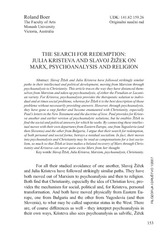The search for redemption : Julia Kristeva and Slavoj Žižek on Marx, psychoanalysis and religion
Апстракт
Slavoj Žižek and Julia Kristeva have followed strikingly similar
paths in their intellectual and political development, moving from Marxism through
psychoanalysis to Christianity. This article traces the way they have distanced them-
selves from Marxism and taken up psychoanalysis, of either the Freudian or Lacani-
an variety. For Kristeva, psychoanalysis provides the therapeutic solution to indivi-
dual and at times social problems, whereas for i ek it is the best description of those
problems without necessarily providing answers. However, through psychoanalysis,
they have gone a step further and become enamoured with Christianity, especially
Paul’s letters in the New Testament and the doctrine of love. Paul provides for Kriste-
va another and earlier version of psychoanalytic solutions, but he enables Žižek to
find the social and political answers for which he seeks. By connecting these intellec-
tual moves with their own departures from Eastern Europe, one from Yugoslav...ia (and
then Slovenia) and the other from Bulgaria, I argue that their search for redemption,
of both personal and social forms, betrays a residual socialism. In fact, their moves
into psychoanalysis and Christianity may be read as compensations for a lost socia-
lism, so much so that Žižek at least makes a belated recovery of Marx through Chris-
tianity and Kristeva can never quite excise Marx from her thought
Кључне речи:
marxism / psychoanalysis / Slavoj Žižek / Julia KristevaИзвор:
Filozofija i društvo / Philosophy and Society, 2007, 153-176Издавач:
- Beograd: Institut za filozofiju i društvenu teoriju
Институција/група
IFDTTY - JOUR AU - Boer, Roland PY - 2007 UR - http://rifdt.instifdt.bg.ac.rs/123456789/50 AB - Slavoj Žižek and Julia Kristeva have followed strikingly similar paths in their intellectual and political development, moving from Marxism through psychoanalysis to Christianity. This article traces the way they have distanced them- selves from Marxism and taken up psychoanalysis, of either the Freudian or Lacani- an variety. For Kristeva, psychoanalysis provides the therapeutic solution to indivi- dual and at times social problems, whereas for i ek it is the best description of those problems without necessarily providing answers. However, through psychoanalysis, they have gone a step further and become enamoured with Christianity, especially Paul’s letters in the New Testament and the doctrine of love. Paul provides for Kriste- va another and earlier version of psychoanalytic solutions, but he enables Žižek to find the social and political answers for which he seeks. By connecting these intellec- tual moves with their own departures from Eastern Europe, one from Yugoslavia (and then Slovenia) and the other from Bulgaria, I argue that their search for redemption, of both personal and social forms, betrays a residual socialism. In fact, their moves into psychoanalysis and Christianity may be read as compensations for a lost socia- lism, so much so that Žižek at least makes a belated recovery of Marx through Chris- tianity and Kristeva can never quite excise Marx from her thought PB - Beograd: Institut za filozofiju i društvenu teoriju T2 - Filozofija i društvo / Philosophy and Society T1 - The search for redemption : Julia Kristeva and Slavoj Žižek on Marx, psychoanalysis and religion SP - 153 EP - 176 DO - 10.2298/FID0732153B ER -
@article{
author = "Boer, Roland",
year = "2007",
abstract = "Slavoj Žižek and Julia Kristeva have followed strikingly similar
paths in their intellectual and political development, moving from Marxism through
psychoanalysis to Christianity. This article traces the way they have distanced them-
selves from Marxism and taken up psychoanalysis, of either the Freudian or Lacani-
an variety. For Kristeva, psychoanalysis provides the therapeutic solution to indivi-
dual and at times social problems, whereas for i ek it is the best description of those
problems without necessarily providing answers. However, through psychoanalysis,
they have gone a step further and become enamoured with Christianity, especially
Paul’s letters in the New Testament and the doctrine of love. Paul provides for Kriste-
va another and earlier version of psychoanalytic solutions, but he enables Žižek to
find the social and political answers for which he seeks. By connecting these intellec-
tual moves with their own departures from Eastern Europe, one from Yugoslavia (and
then Slovenia) and the other from Bulgaria, I argue that their search for redemption,
of both personal and social forms, betrays a residual socialism. In fact, their moves
into psychoanalysis and Christianity may be read as compensations for a lost socia-
lism, so much so that Žižek at least makes a belated recovery of Marx through Chris-
tianity and Kristeva can never quite excise Marx from her thought",
publisher = "Beograd: Institut za filozofiju i društvenu teoriju",
journal = "Filozofija i društvo / Philosophy and Society",
title = "The search for redemption : Julia Kristeva and Slavoj Žižek on Marx, psychoanalysis and religion",
pages = "153-176",
doi = "10.2298/FID0732153B"
}
Boer, R.. (2007). The search for redemption : Julia Kristeva and Slavoj Žižek on Marx, psychoanalysis and religion. in Filozofija i društvo / Philosophy and Society Beograd: Institut za filozofiju i društvenu teoriju., 153-176. https://doi.org/10.2298/FID0732153B
Boer R. The search for redemption : Julia Kristeva and Slavoj Žižek on Marx, psychoanalysis and religion. in Filozofija i društvo / Philosophy and Society. 2007;:153-176. doi:10.2298/FID0732153B .
Boer, Roland, "The search for redemption : Julia Kristeva and Slavoj Žižek on Marx, psychoanalysis and religion" in Filozofija i društvo / Philosophy and Society (2007):153-176, https://doi.org/10.2298/FID0732153B . .


